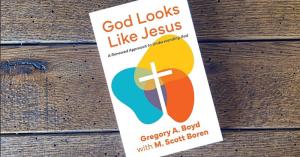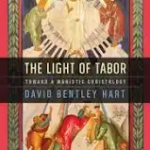Here I begin a new book discussion. My friend Gregory Boyd wrote A God Who Looks Like Jesus: A Renewed Approach to Understanding God (Herald Press) with M. Scott Boren in 2024. I has just been published in 2025.
I know Greg personally, but I don’t know Boren. I will therefore use Greg’s first name as we are former colleagues and still friends.
The book’s Introduction reveals some very personal information about Greg’s past. I am proud that he is so transparent. Speaking (writing) autobiographically, he says that in his early days as a Christian he thought that “God himself—a divine tyrant…had set me up to fail by infusing me with hormones I couldn’t control and putting me in a home with unlimited access to porn. All so he could delight in watching me flounder before casting me into eternal fire.” (15)
Greg says that “the way we envision God is the single most important thing in our life.” (17) He testifies that he came to believe in “A God who did not measure my worth by my ability to meet God’s standards but who embraced me as I was—broken, flawed, and yet unimaginably loved.” (16)
Ultimately, Greg came to see God through the lens of Jesus Christ: “The beauty of Christ…opens our spiritual eyes to envision the beauty of God shining through Jesus Christ.” (17)
This is, of course, just the beginning of Greg’s theological project in this book. But I would say, knowing Greg, that it is the foundation of his whole theology. There is no “hidden God” lurking behind Jesus who is different than Jesus (as Luther sometimes feared and even argued).
Greg’s book reminds me of one I read some years ago called A Christlike God by British theologian John V. Taylor. But, as I have read on deeper into Greg’s book I see some striking differences. Greg’s book is bolder. Some will say too bold. His vision of God in the “face” of Jesus Christ transforms everything, away from a focus on God as wrathful, judgmental, punitive and violent. But more about that later.
Read God Who Looks Like Jesus with an open mind and consider its arguments. Then, if you have read the Introduction, feel free to respond. Otherwise, feel free to ask a question. But please do not jump ahead in the book. Let’s stick to the Introduction for now. In about a week I will write about Chapter One: The One Eternal Word.
*Note: If you choose to comment, make sure your comment is relatively brief (no more than 100 words), on topic, addressed to me, civil and respectful (not hostile or argumentative), and devoid of pictures or links.*












